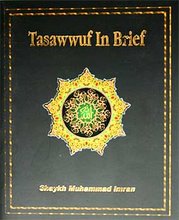بسم الله الرحمن الرحيم
Allah Ta’ala says in the Holy Quran:
"و عاشروهن بالمعروف"
Translation: "Consort with them (your women) in kindness"
This lesson is regarding the all-important matter of fulfilling the rights of fellow humans. This is a vital area in the life of every person and it is the make up of three-quarters of Islam. Hence, when you look into the books of Islamic Jurisprudence, for example, the famous Hidaya, in Hanafi Fiqh, you find it in four large volumes. One of the four volumes pertains to Ibaadat (acts of worship), whilst the remaining three relate to what is referred to as Mu’aamalat and Mu’aasharat (dealings and social life).
A Hadith is mentioned by Imam al-Tirmizhi in his Jami’ on the authority of Sayyiduna Abu Hurairah (May Allah be pleased with him). He reported a story of an event that took place. The Prophet, sallallahu alaihi wasallam, said to his Companions: "Whom do you consider as a bankrupt?" They said: "The one who does not have a dinar or dirham (money)." The Prophet, sallallahu alaihi wasallam, said: "The real bankrupt is the one who comes with mountains of good deeds but he also comes with many bad deeds that are related to attacking and harming the people." In this case, the bad deeds are not easily omitted because they are related to the rights of human beings. This person may wrong others by slander, backbiting, killing, etc. As a result, his good deeds will be taken from him in the Hereafter as a matter of just. In addition to that, the Prophet, sallallahu alaihi wasallam, says part of the bad deeds of the people whom he has wronged will be added to his record and the result would be that he will be thrown into the Hellfire. (This is a summary of the Hadith)
The importance of fulfilling the rights of fellow (Huqooq al-Ibaad) could never be stressed enough.
Now, let us first understand what we usually find in the Quran: the Quran normally gives a general order, without actually explaining it in detail. This explanation is found in the Ahadith. For example, Allah Ta’ala says:
"وأقيموا الصاوة"
Translation: "Establish prayer…" (Al-Baqarah: 43)
One can not find anywhere in the Quran the details on how to perform Salaah, so we look into the Ahadith and we find in depth explanations. However, when it comes to the matter of the rights of fellow humans, Allah went to great lengths to give a complete understanding. One chapter of the Quran: "al- Hujurat," was revealed totally on this subject.
Furthermore, this topic of "rights" can be sub-headed for the different people we interact with and who are affected by us. The wisdom-filled Quran also makes note of this and shows us that there are certain people whose rights are of utmost importance and neglecting them is a grave sin, leading to eternal failure. In such cases, the Quran gives extra detail and explanation. One such example is the relationship one has with his parents.
Another such example, which is the focus of today’s lesson, is the relationship between husband and wife.
In earlier times, before Islam, in the period known in history as the Era of Ignorance, women’s rights were non-existent. They would be deprived of even the simplest of niceties. They were treated like animals. Then came Islam. Then came the Holy Quran with its practical example, Muhammad, sallallahu alaihi wasallam. The much-needed rights of women followed very soon after.
A point to note here is that Islam introduced rights for women over 1400 years ago; whilst until very recently, British women were very much subdued. For example, in 1918 the British Parliament finally passed a bill allowing women over the age of 30 to vote! This is one of many such examples.
So, the Quran recognises that an essential chapter of life is marriage. Then the Quran stresses the importance of living together without oppression in the least bit. Especially, giving importance to the way a man treats his wife. Hence the verse "consort with them in kindness."
Imam Muhiy al-Din Abu Yahya ibn Sharaf al-Nawawi has brought a chapter in his famous "Riyadh al-Saliheen" with the name: "The Chapter of Recommendations with regard to Women."
The opening Hadith of this chapter is: Abu Hurairah (May Allah be pleased with him) reported: The Messenger of Allah sallallahu alaihi wasallam said: "Take my advice with regard to women: Act kindly towards women, for they were created from a rib, and the most crooked part of a rib is it’s uppermost. If you attempt to straighten it; you will break it, and if you leave it alone it will remain crooked; so act kindly toward women." (Al-Bukhari and Muslim)
In another narration of Al-Bukhari and Muslim, the Messenger of Allah sallallahu alaihi wasallam said: "A woman is like a rib, if you attempt to straighten it, you will break it; and if you benefit from her, you will do so while crookedness remains in her".In another narration of Muslim, the Messenger of Allah sallallahu alaihi wasallam said: 'Woman has been created from a rib and will in no way be straightened for you; so if you want to benefit from her, you will benefit from her while crookedness remains in her. If you attempt to straighten her, you will break her, and breaking her is divorcing her". The secret of a pleasant family life lies in this advice of the Prophet sallallahu alaihi wasallam with its emphasis on kind treatment to wives.
The rib is bent. It is obvious that if the rib was not curved, it would not serve its vital purpose and a rib is considered to be a beautiful blessing from Allah Ta’ala, despite being curved. In the very same way, it is not considered a defect in a woman that she is created from the curved rib. Just as we see in the decoration of masaajid, one of the main aesthetics is the curved/domed design of the windows and doors, in exactly the same way, we say that a woman is beautiful and not defected due to her being created from a bent rib.
A good relationship between husband and wife is paramount for the progress of any community. It has been placed in the trust of two people who marry to fulfil each others rights, live together with love and happiness, and consequently bring children into the world who, following the correct example set by their loving parents, will contribute to making a community a better one.
May Allah Ta’ala grant us all the ability to act as we have taught by the Quran and Sunnah of our beloved master, Muhammad sallallahu alaihi wasallam.
Insha’Allah, this topic will be carried on next week.
واخر دعوانا ان الحمد لله رب العالمين
وبالله التوفيق والعون فإنه هو الموفق والمعين




No comments:
Post a Comment